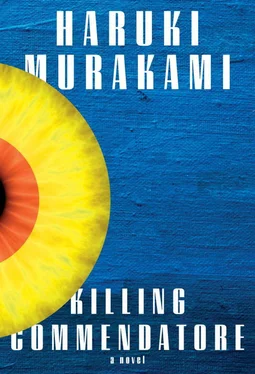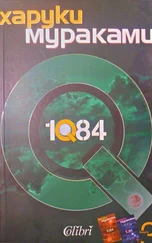Menshiki ambled over. “We’ll have them do a more thorough examination of that stone-lined chamber,” he said. “At first glance it looks like just a hole, but I’ll have them check it all out from one end to the other. They might discover something. Though I sort of doubt it.” He looked at the bell I’d placed in front of the shrine. “It’s odd that this bell’s the only thing left. Since someone had to be inside there in the middle of the night ringing the bell.”
“Maybe the bell was ringing by itself,” I ventured.
Menshiki smiled. “An interesting theory, but I doubt it. For whatever purpose, someone was sending out a message from down inside that hole. A message to you, or maybe to us. Or to people in general. But whoever it was has vanished like smoke. Or else slipped away from there.”
“Slipped away?”
“Slipped right past us.”
I couldn’t understand what he was getting at.
“Because the soul isn’t something you can see,” Menshiki said.
“You believe in the existence of the soul?”
“Do you?”
I didn’t have a good answer.
“I believe that it’s not necessary to believe in the soul’s existence. But turn that around and you come to the belief that there’s no need to not believe in its existence. A kind of roundabout way of putting it, but do you understand what I’m getting at?”
“Sort of,” I said.
Menshiki picked up the bell from where I’d placed it in front of the shrine. He held it out and rang it several times. “A priest probably breathed his last there, underground, ringing this bell and chanting sutras. All alone, shut away in the pitch-black darkness, that heavy lid in place, in the bottom of a sealed well. And most likely all in secret. I have no idea what sort of priest he was. A respectable priest, or merely some fanatic. Either way, someone constructed a stone tumulus on top of it. I don’t know what happened after that, but people then completely forgot he’d been voluntarily buried under here. Then a big earthquake occurred at some point, and the mound collapsed until it was just a pile of stones. It could have been during the Kanto earthquake of 1923, since certain areas around Odawara suffered real damage back then. And everything was swallowed up into oblivion.”
“If that’s true, then where did the priest who died there—the mummy, I mean—disappear to?”
Menshiki shook his head. “I don’t know. Maybe at some point someone dug up the hole and took him away.”
“To do that they’d have to move all these stones and then pile them up again,” I said. “And then who was ringing the bell yesterday in the middle of the night?”
Menshiki shook his head again, and smiled faintly. “Good grief. We used all this equipment to move the stones and open up the chamber, and in the end all we found out for sure is that we don’t know a single thing. All we managed to get was an old bell.”
—
They examined the stone chamber thoroughly, and merely determined that there were no hidden devices anywhere. This was merely a round hole, lined with a stone wall, 8.2 feet deep with a diameter of 5.9 feet (they made precise measurements). Finally, they loaded the backhoe up onto the truck bed, and the workers collected all their tools and left. All that remained was the open hole and the metal ladder. The foreman was kind enough to leave it behind. They also laid several thick boards on top of the hole so no one would fall into it by mistake. They left some heavy stones on top to weigh the boards down so they wouldn’t blow away in a strong wind. The wooden lattice cover was too heavy to lift, so they left it on the ground nearby and covered it with a plastic tarp.
Before they left, Menshiki told the foreman not to mention this operation to anyone. It had archaeological significance, and he wanted, he said, to keep it from the public until the time was right to announce the find.
“Understood,” the foreman said with a serious expression. “We’ll leave it all here. And I’ll warn the others not to say anything about it.”
After the workers and heavy machinery had left and the mountains were blanketed in their usual stillness again, the dug-up area looked like skin after a major operation, shabby and pitiful. The formerly vigorous clump of pampas grass had been trampled down beyond recognition, the ruts left by the backhoe like stitches left behind in the dark, damp soil. The rain had cleared up completely, though the sky was still covered by an unbroken layer of monotonously gray clouds.
When I looked at the pile of stones now stacked up on another piece of ground, I couldn’t help but think, We should never have done this. We should have left them the way they were. On the other hand, though, the indisputable fact was that it was something we had to do. I couldn’t go on listening to that strange sound night after night. But if I hadn’t met Menshiki, I never would have had the means to dig up that hole. It was only because he had arranged for the workers, and had paid for the whole thing—I had no clue how much it cost—that the operation had been possible.
But meeting Menshiki and, as a result, having this large-scale excavation take place—was it really all just coincidence? Had it all just fallen together by chance? Weren’t things just a little too convenient? Hadn’t the scenario been all planned out in advance? With all these unanswered doubts, I went with Menshiki to the house. He carried the bell we’d unearthed. He never let go of it the whole time we were walking. As if trying to read, from the touch of it, some kind of message.
As soon as we got back inside Menshiki asked, “Where should I put this bell?”
Where indeed? I had no idea. For the time being, I decided to place it in the studio. Having that weird object under the same roof didn’t sit well with me, but that said, I couldn’t just toss it outside. It was, no doubt, a valuable Buddhist implement, imbued with a certain soulfulness, so I couldn’t just neglect it. I decided to put it in the sort of neutral zone of the studio, which felt like a separate annex. I cleared a space on the long, narrow shelf used for painting materials and placed it there. Next to the large mug used to hold brushes, it even looked like some specialized painting tool.
“What a strange day,” Menshiki said.
“I’m sorry you had to use up your entire day for this,” I said.
“No, don’t apologize. It’s been very interesting,” Menshiki said. “And this isn’t the end of it, I would imagine.”
Menshiki had an odd look on his face, as if gazing far away.
“Meaning something else is going to happen?” I asked.
Menshiki chose his words carefully. “I can’t explain it well, but I get the feeling that this is only the beginning.”
“Only the beginning?”
He held his palms upward. “I’m not sure, of course. Maybe that’ll be it, and we’ll just be left thinking what a strange day that was. That would probably be the best outcome. But nothing’s been resolved. The same questions remain. And these are very important questions. That’s why I have a hunch that something else is going to happen.”
“Something connected to that stone-lined chamber?”
Menshiki gazed outside for a moment before he spoke. “I don’t know what’s going to happen. It’s just a hunch.”
And of course it turned out as he’d felt—or predicted—it might. Like he said, that day was only the beginning.
That night I had trouble sleeping. I was anxious whether the bell I’d left in the studio would start ringing in the middle of the night. If it did, then what would I do? Pull the covers up over my head and pretend not to hear anything until the next morning? Or take my flashlight and go to the studio to check it out? And what would I find there?
Читать дальше











